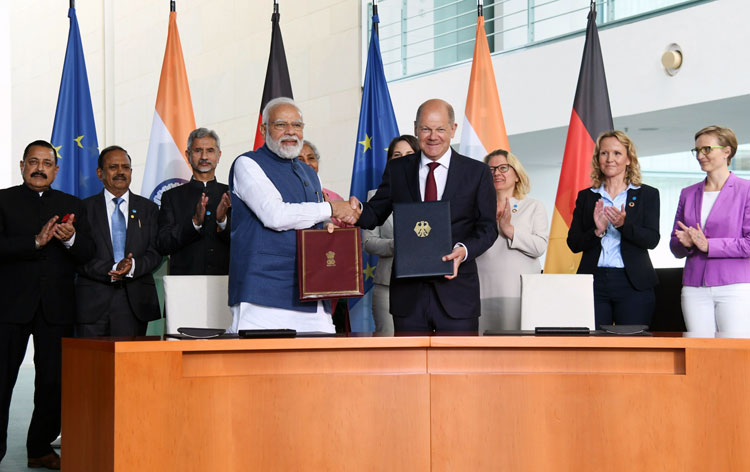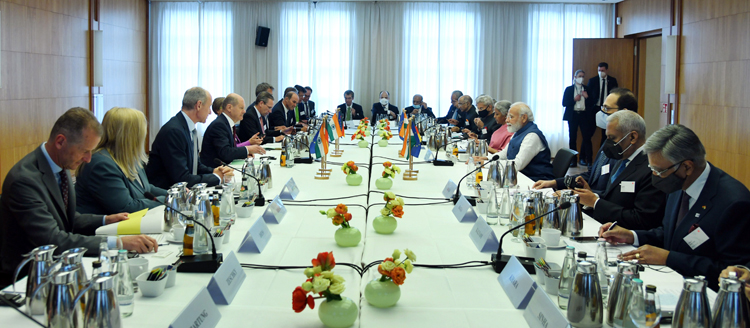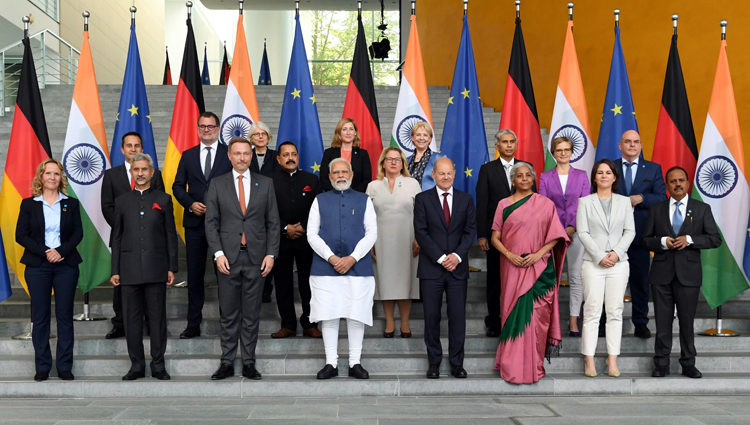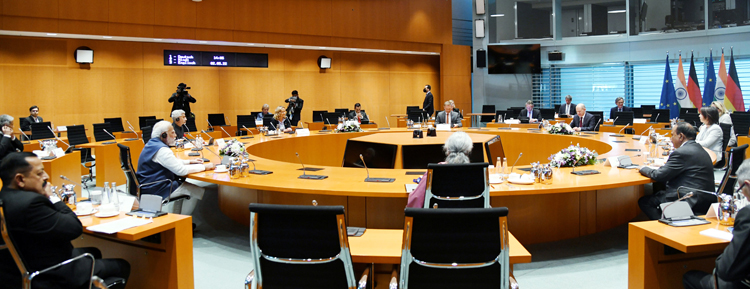INDIAN ARMED FORCES CHIEFS ON OUR RELENTLESS AND FOCUSED PUBLISHING EFFORTS

The insightful articles, inspiring narrations and analytical perspectives presented by the Editorial Team, establish an alluring connect with the reader. My compliments and best wishes to SP Guide Publications.

"Over the past 60 years, the growth of SP Guide Publications has mirrored the rising stature of Indian Navy. Its well-researched and informative magazines on Defence and Aerospace sector have served to shape an educated opinion of our military personnel, policy makers and the public alike. I wish SP's Publication team continued success, fair winds and following seas in all future endeavour!"

Since, its inception in 1964, SP Guide Publications has consistently demonstrated commitment to high-quality journalism in the aerospace and defence sectors, earning a well-deserved reputation as Asia's largest media house in this domain. I wish SP Guide Publications continued success in its pursuit of excellence.
- Prime Minister Modi Visits Punjab’s Adampur Air Base, Interacts with Airmen after Successful ‘Operation Sindoor’; Stern Message to Pakistan
- The layered Air Defence systems that worked superbly, the key element of Operation Sindoor
- Operation Sindoor | Day 2 DGMOs Briefing
- Operation Sindoor: India strikes back with Precision and Purpose
- Operation Sindoor: Resolute yet Restrained
- India’s Operation Sindoor Sends a Clear Message to Terror and the World – ‘ZERO TOLERANCE’
- Japan and India set forth a defence cooperation consultancy framework, talks on tank and jet engines
- Terrorist Attack in Pahalgam in Kashmir: Unfolding a long surgical war against PAK
- Lt General Pratik Sharma takes over Command of Indian Army's Northern Command
Reviving Indo-German defence cooperation
Both India and Germany are actively seeking to enhance research, co-development and co-production activities bilaterally, under European Union and with other partners, for enhancing high-technology trade, including defence goods

Though political, strategic and economic imperatives drive the Indo-German partnership for mutually beneficial ties, Prime Minister Narendra Modi's visit to Berlin on May 02, 2022, will help re-invigorate the defence cooperation also, with the decision to revive the defunct Defence Technology Sub Group (DTSG). This Group is expected to identify areas of cooperation in assisting Indian armed forces acquire state-of-the-art technology and manufacturing practices.
India and Germany signed strategic partnership cooperation agreement in 2000 and since then it has been infused with new elements like Intergovernmental Consultations (ICG), which was launched in 2011. This was formed at the level of the Heads of Government of which the sixth meeting was held in the latest visit of Prime Minister Modi with new German chancellor Olaf Scholz, who has assumed the mantle of Europe's most advanced economy almost six months ago. It is significant that Germany has chosen India, among it's few select partner States for this kind of dialogue mechanism. Relationship with Germany assumes importance because of Germany's key role in the 27 member European Union.
My Germany visit has been a productive one. The talks with @Bundeskanzler Scholz were extensive and so were the Inter-Governmental Consultations. I got a great opportunity to interact with business and Indian community leaders. I thank the German Government for their hospitality. pic.twitter.com/bpu9yhk0Xe
— Narendra Modi (@narendramodi) May 3, 2022
As is known, in the wake of Russia-Ukraine war, Germany has decided to enhance the level of its defence spending. In view of its renewed focus on building up its armed forces to counter the new threats emerging from Russia-China alliance, German decision to revive the Defence Technology Sub Group (DTSG) is expected to re-energise India-Germany defence cooperation. The DTSG was very vibrant in the decade of eighties of the previous century when Germany helped India to develop the Arjun Main Battle Tank with its MTU engine and the HDW submarines. This nascent partnership to build a strong strategic and defence relationship was severed after the allegations of kickbacks in the submarine deal for direct sale of two submarines and supply of kits and assembly for production of these two submarines in MDL materialised. However, later agreement for manufacture of additional two submarines with transfer of technology to Mazagon Dock Shipbuilders Limited was cancelled.
Both the countries acknowledged the need to further deepen bilateral security and defence cooperation as strategic partners to jointly address global security challenges
The HDW submarines which were supplied in early nineties are still in service with Indian navy. Had India continued with the HDW program to manufacture two more submarines in India, Indian Naval shipyards would have acquired the necessary expertise and started making submarines on its own. But Indian government decision to cancel the deal to manufacture two additional submarines in India, proved to be biggest setback to Indo-German defence cooperation and to the Indian Navy program to equip itself with adequate undersea deployment. Not only this, the nascent Indian-Germany defence cooperation received a big jolt and since then cooperation for defence programs cooled down.
However, in the new drastically changed geo-political environment the decision of Germany and India to revive the Defence Technology Sub Group is very significant. This will help diversify the acquisition of defence systems and technology for the Indian armed forces. Also, in view of renewed thrust and focus on indigenisation of defence equipment, Germany is well equipped for meeting the demands of an Atmanirbhar Bharat (Self Dependent India).
Discussions continue between PM @narendramodi and Chancellor Scholz in Berlin. Both leaders are reviewing the full range of bilateral ties between India and Germany, including giving an impetus to trade as well as cultural linkages. @Bundeskanzler pic.twitter.com/Wj3M8mVQjr
— PMO India (@PMOIndia) May 2, 2022
Significantly , with a view to deepen the security cooperation, India and Germany agreed to begin negotiations on an agreement on the exchange of classified information. Both the countries acknowledged the need to further deepen bilateral security and defence cooperation as strategic partners to jointly address global security challenges. Indian and German interlocutors agreed to intensify bilateral exchanges on security and defence issues. Germany and India are members of group of four nations who are seeking reform in United Nations Security Council and permanent membership for all four including Brazil and Japan. During the Modi-Scholz summit, the two governments expressed support to each other. Germany also reiterated its support to India's early entry into the Nuclear Suppliers Group.

Furthermore, both sides are actively seeking to enhance research, co-development and co-production activities bilaterally, under European Union and with other partners. The two Governments expressed support for enhancing high-technology trade, including defence goods, between the two countries.
The two sides expressed satisfaction on the launch of the India-EU Trade and Technology Council, which will foster closer engagement in addressing challenges at the nexus of trade, trusted technology and security
Indo-German strategic cooperation is deeply embedded in the recently agreed overall India EU security cooperation. Germany is a major component in the India-EU security cooperation. So, it is natural that on bilateral basis the two countries have expressed the same commitment to deepen security and strategic cooperation.
Hence India and Germany naturally welcomed the deepening of the strategic cooperation between India and the EU, particularly after the India-EU Leaders' meeting in Porto in May 2021, and agreed to further strengthen it. They look forward to the implementation of the India-EU Connectivity Partnership. The two sides expressed satisfaction on the launch of the India-EU Trade and Technology Council, which will foster closer engagement in addressing challenges at the nexus of trade, trusted technology and security.

To broaden their strategic cooperation, India and Germany underlined the importance of an effective rules-based international order with the United Nations and the fundamental principles of international law as enshrined in Charter of the United Nations at its core, including respect for the sovereignty and territorial integrity of all States. They reaffirmed their respective Governments' determination to strengthen and reform multilateralism to tackle current and future challenges, to defend peace and stability globally, to bolster international law, and to defend the fundamental principles of peaceful settlement of conflicts and the sovereignty and territorial integrity of states.
As both countries have similar stakes and strategic interests in the Indo-Pacific region, both sides stressed the significance of a free, open and inclusive Indo-Pacific, recognising the centrality of ASEAN
As both countries have similar stakes and strategic interests in the Indo-Pacific region, both sides stressed the significance of a free, open and inclusive Indo-Pacific, recognising the centrality of ASEAN. They acknowledged the Policy Guidelines for the Indo-Pacific of the German Federal Government, the EU Strategy for Cooperation in the Indo-Pacific and the Indo-Pacific Oceans Initiative enunciated by India. Both sides underlined the importance of unimpeded commerce and freedom of navigation in accordance with International Law, notably the United Nations Convention on the Law of the Sea (UNCLOS) 1982, in all maritime domains including in the Indian Ocean and the South China Sea. As an important milestone in Germany's growing engagement with the Indo-Pacific region, both sides welcomed the port call by the German Navy Frigate 'Bayern' in Mumbai in January 2022. Germany also agreed to welcome an Indian Naval ship on a friendly visit to a German port next year.

This deepening naval interaction has been reinforced at the political level, with the prized invitation to Prime Minister Narendra Modi to the world's most influential group of nations G-7, which is holding its summit in June 2022. Inspite of India holding a different view on the issue of sanctions and condemnation of Russian military invasion in Ukraine, this invitation has been described as recognition of India's principled stand on the issue. In view of the current international scenario and fast changing geopolitics, India and Germany would both like to move away from its dependence on Russia. India in defence sector and Germany in economic sector, because of its heavy import of oil and gas from Russia, This offers an opportunity to both Germany and India to re-energise their defence cooperation, especially in the joint development and production of defence equipment. Since Germany has decided to increase its defence spending, the German armed forces would be seeking state of the art defence systems, which can be jointly produced with India based on advanced German technology and expertise.





